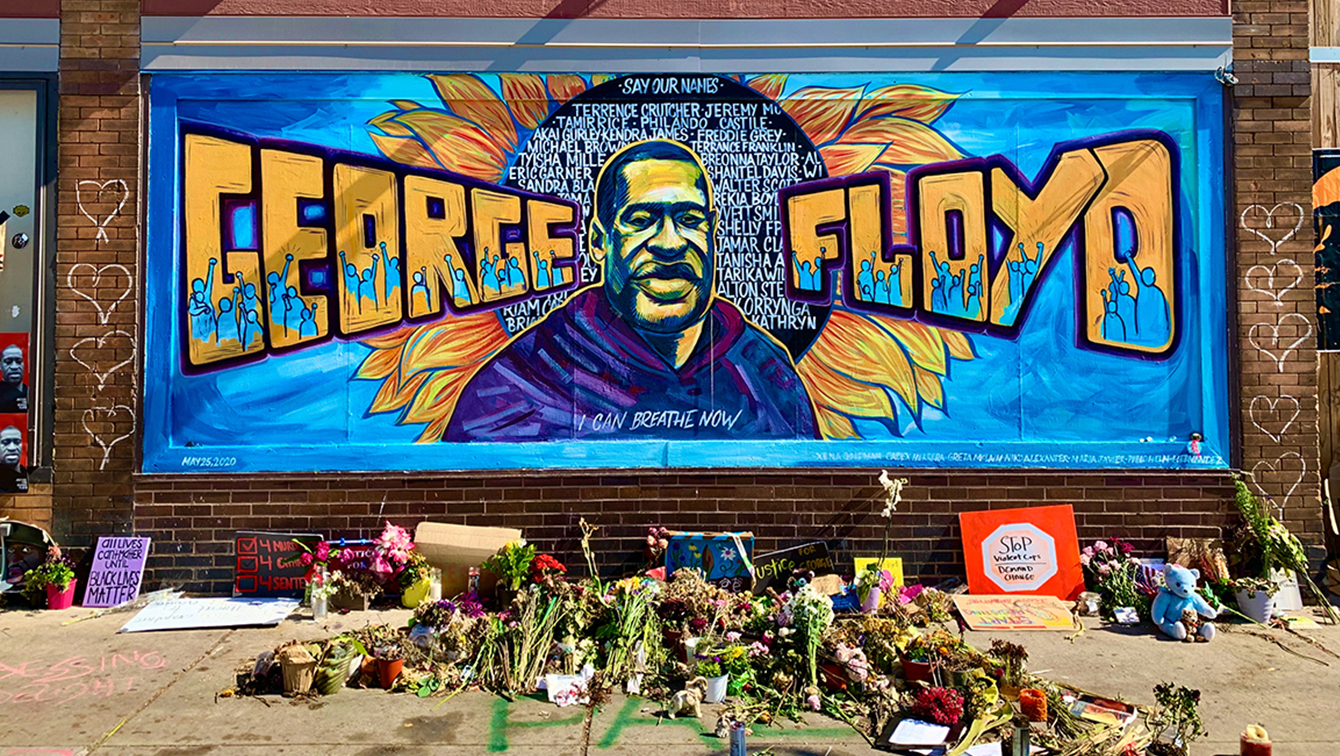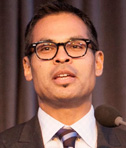Community Engagement Racial and Ethnic Disparities Young Adults July 12, 2021
More than a year since the murder of George Floyd in Minneapolis, how have community leaders, organizers, and activists continued to champion criminal justice reform and call for action to stop continued police violence? What has been the impact on them, and what types of reforms have had the most impact, locally? What changes would they like to see implemented in the future? And how does all this fit in with the MacArthur Foundation’s Safety and Justice Challenge (SJC) and its goal of reducing jail populations across America?
Ashley Goldon, a fellow with JustLeadership USA, is a member of the Steering Committee for a new cohort of SJC cities and counties that will deepen their efforts to eliminate racial disparities in their justice system. She is also in the process of gathering support to qualify as a licensed social worker and points out that the profession of social work identified mass incarceration as a priority problem more than a decade ago.
“George Floyd’s death was a catalyzing moment,” she said. “But I still don’t think people really grasp the true weight of racism and its effects on society. By that I mean how deep the issue runs. Even with our justice reform efforts, I still think people miss how it’s connected to racism, and that’s just incredible.”
It is a theme echoed across the activist landscape—that cries of racial injustice are not new, but that many in the movement for criminal justice reform continue to underestimate the importance of racial equity. Nevertheless, George Floyd’s death did shift that consciousness slightly, people said.
“There’s a clear reality that racial injustice in the criminal justice system has been going on longer than a year or so,” said Keith Smalls, a community representative on the Charleston County Criminal Justice Coordinating Council. “But what’s shifted in the year since George Floyd’s death is that our White neighbors have also got on board and said we need change to happen, particularly where law enforcement is concerned. When you look at the crowds protesting it’s not just Black people. It’s White allies too. And that has made a difference.”
Mr. Smalls said criminal justice reform will not be credible until more people who have experience of incarceration are brought to the decision-making table. But he expressed hope that senior executives at corporations across America are lending their weight to calls for change at the policy level.
“What we’re saying is no longer falling on deaf ears,” he said.
Jose Bernal is with the Ella Baker Center, and a longstanding community leader in San Francisco. He was the SJC representative on San Francisco’s Reentry Council, where he was part of the movement that successfully worked for the closure of a seismically unfit jail facility, 850 Bryant Street, in 2020. Mr. Bernal was incarcerated at the jail just under a decade ago and spent most of his time in San Francisco’s jail system in an isolation cell behind Plexiglas, under constant bright lights.
“The conditions of confinement I experienced never helped me in any way,” he said. “Instead, they just made my desire to end my own life stronger. I’m only alive today because my family always came to visit me and didn’t give up on me.”
The COVID-19 pandemic, coupled with Mr. Floyd’s death, brought about “a reckoning,” he said, which was a factor in the closure of the jail. San Francisco’s Board of Supervisors had been talking about closing 850 Bryant since 1996. But for some of the supervisors voting for the closure, the reckoning was a factor in their support. Fifty percent of San Francisco’s incarcerated population are Black people, even though they make up fewer than five percent of the city and county’s population. “We still have a long way to go,” Mr. Bernal said. “But facilities like 850 Bryant are symbols of an era of mass incarceration we must get out of. We can’t erase our history, but we can create our future, and our elected officials have the power to lead us forward.”
In other jurisdictions too, elected officials have found support for reforms. Portland City Council in Oregon voted in 2020 to cut $15 million from the Police Bureau, eliminating 84 positions. One city council member described the budget as a “moral document.” Multnomah County, in which Portland is located, is an SJC site.
“We are at the cusp of meaningful change,” said Portland’s former Assistant Police Chief Kevin Modica, who recently retired. At the police bureau he was a member of the Multnomah County SJC cohort, and he is now an outspoken advocate for police reform. He continues to work on the mission of reducing racial and ethnic disparities in the criminal justice system, particularly at the initial point of contact, which is usually through contact with the police.
“The profession of peace keeping must evolve if it is to serve the public in the best way, considering some of the toughest circumstances,” he said. “We need to reconstitute an agency at the right size, that is right-minded, and for the benefit of the whole community.”
In Cook County, Kim Davis-Ambrose works in the county president’s office for the Justice Advisory Council. She has been working with community advocates and consultants at Everyday Democracy to take the county through a dialogue to change process.
“People feel as though the justice system is a more sophisticated form of slavery,” she said. “They feel like it’s a money-making system, especially with the privatization of the prisons. And when you look at the police in terms of the inequities and injustices and how it has always been, their code of silence, how they overpoliced their communities, and how the accountability and the transparency [do] not exist, that’s hard. People feel the public defenders are not working with them. They feel like if you are arrested and have a criminal background, that never goes away. And most importantly, they talk a lot about how hard it will be to fix things, and how there is a lack of hope.”
It’s important not to deny or sugarcoat these feelings. But by taking people through an intentional process, Ms. Davis-Ambrose said they at least feel listened to, and begin to recognize the opportunity for change.
In New Orleans, Sade Dumas runs the Orleans Parish Prison Reform Coalition, and has seen the jail population reduced from thousands to 774 in her time in the city. Her organization was started in 2004 by a diverse, grassroots group of people with the shared goal of shrinking the size of the main New Orleans jail and improving conditions of confinement inside. It includes community activists, lawyers, service providers, formerly incarcerated people, and their family members.
Born in the majority Black and marginalized Lower Ninth Ward, which was devastated by poorly maintained levees that broke during Hurricane Katrina, Ms. Dumas remembers neighbors calling the police in her youth, and the police simply not showing up, just as rescue was slow to arrive for Black families stuck on their rooftops in the wake of the broken levees.
“It means the idea of defunding the police has a different connotation for me, because I grew up in an area where the police weren’t showing up even when they were technically funded,” she said.
Ms. Dumas said that the year since Mr. Floyd’s death has brought positive changes in the city—in particular, further reductions in the jail population—but that the changes continue to be gradual. A new, more progressive district attorney, Jason Williams, has promised to deliver change, she said. But at the same time, the local sheriff responsible for running the Orleans Parish Prison is pushing for an 89-bed psychiatric jail as part of the facility.
“We know that people living with mental illness do not belong in the jail,” she said. “And yet the sheriff has been pushing to house more of them, every step of the way. And the community is fighting him on this. People with mental health challenges leave that place worse off if they leave at all.”
On the state policy level, the 2020 racial justice protests have had an impact, but they have also meant it is important to tread carefully around the issue of race with state legislators to get policy passed, said Will Snowden, director of the New Orleans Office of the Vera Institute of Justice.
“What I would share is the conversation about race in the South is still very polarizing,” he said. “So even when I go to the state capitol to talk about any legislation that we might be supporting, I have to do this calculus. Do I stay true to what the data tells me in terms of how there are disparities largely representing overrepresentation of Black men in our criminal legal system? Or do I talk about some other things and make race equality my second or my third point? I think I’m going to turn some of the legislators off.”
George Floyd’s death and the subsequent protests have brought a lot of attention and focus to policing in America, Mr. Snowden said. But “there is a polarizing effect that I think has been created from the movement that was inspired after George Floyd.”
Mr. Snowden said the polarization is “not necessarily a bad thing,” but that it “adds to the calculus that I have to do in my policy work.”
Thanks to the advocacy of Vera and others, including impacted people with the Voice of the Experienced, Governor of Louisiana John Bel Edwards just signed a bill into law restoring jury rights to people with felony convictions. Vera first tried to get the bill passed in 2019 when Mr. Snowden was talking more about race with legislators.
“I did talk about race, and the reaction that we got was a teachable moment,” Mr. Snowden said. “Because when we bought it up in 2021, we didn’t talk about race in terms of the benefits. We talked about how when people are returning home from prison, they paid their debt to society. They’re concerned about safety just as much as everyone else. And so, they should have the right to serve on a jury to vote in favor or against their fellow community member, just in the same way they vote for their judges and their state representatives. If we want people to reenter into our communities, restoring those rights as a part of that process is a priority.”
This time around, Mr. Snowden points out, the most important thing for his work is that the bill passed.
Dialogue and collaboration between community members and law enforcement leadership can still have positive impacts. Erik Bringswhite is a Native American activist in Pennington County, South Dakota, another SJC site. He serves on the local criminal justice coordinating group with law enforcement leadership and is focused on helping to reduce racial disparities and improve equity.
“When I first came on board, it was as a community member, and I had very little faith, or trust, or belief in the system,” he said. “But I’ve got to say that in personalizing and looking beyond the title of the person, like the sheriff, the chief judge, or the state’s attorney, and just having this human interaction and discussion, these guys have convinced me of their sincerity and the genuine efforts to really, really change the things that are not working for the community. That is huge.”

